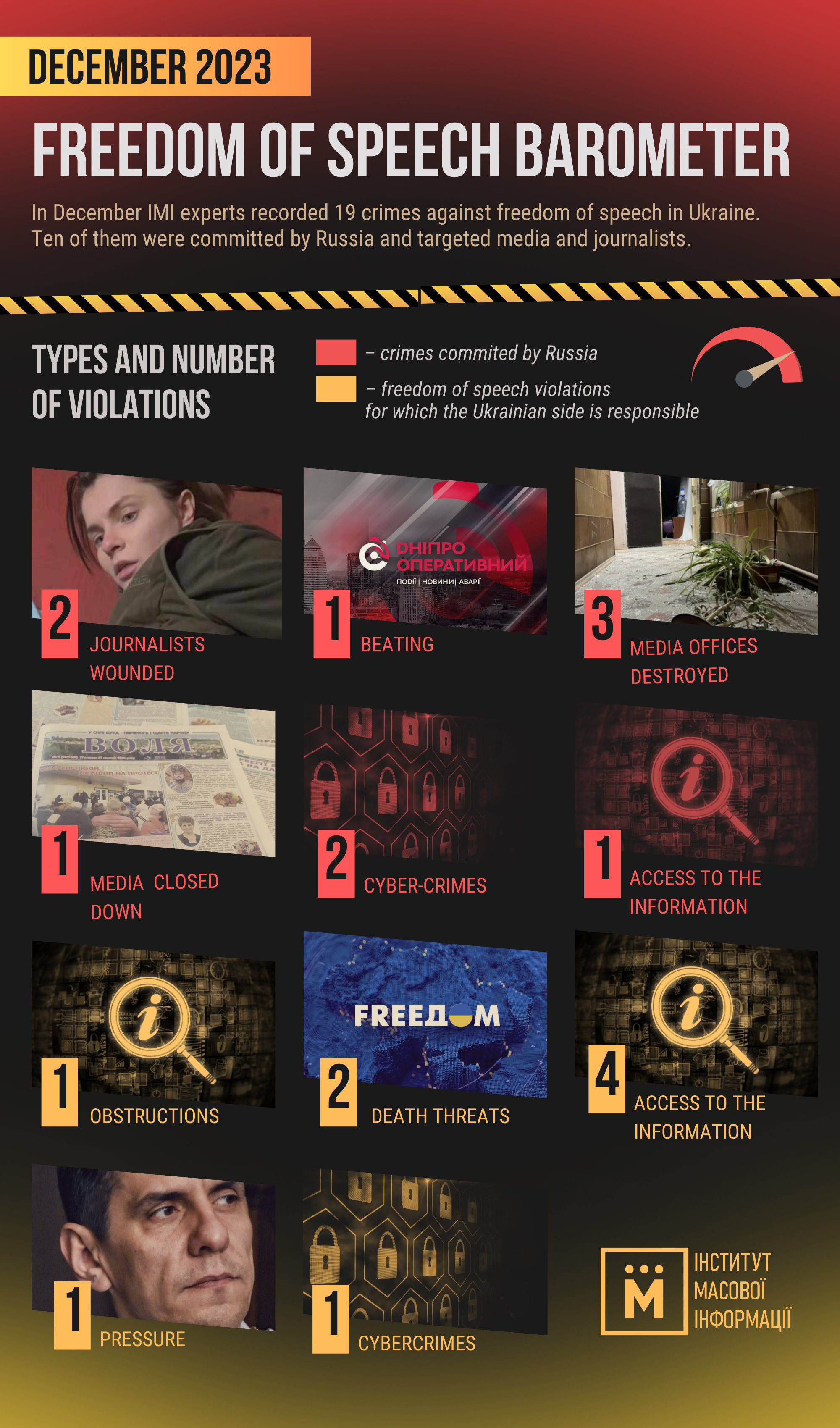IMI records 19 freedom of speech violations in Ukraine in December

In December the IMI experts recorded 19 cases of freedom of speech violation in Ukraine. In 10 of those cases, the Ukrainian side was responsible, and six violations were committed by Russia targeting the media and journalists.
This is evidenced by the monthly monitoring "Freedom of Speech Barometer" by the Institute of Mass Information.
The crimes against the media committed by Russia include injuring journalists, death threats, cyber attacks, shelling resulting in media offices being destroyed and Ukrainian broadcasting being disabled, and media outlets closing down due to the war.

At the same time, the IMI recorded eight freedom of speech violations for which Ukrainian citizens are responsible. These include death threats, restricting access to public information, indirect pressure and cyber crime.
Vlada Liberova, an Ukrinform photographer and program co-host, was wounded in Donetsk oblast in December. She and her husband came under Russian fire while driving towards Avdiivka. According to her, she took an examination, which showed that a fragment four centimeters large got into the soft tissues of her body; now she cannot move on her own.
A Ukrainian interpreter for the German TV channel ZDF and a British citizen working as a security advisor for a team of German journalists were injured by the Russian shelling strike on Kharkiv on December 30. At the time of the explosion, the channel's team was in the Kharkiv Palace Hotel, which was hit by a Russian missile. The channel's reporter Alica Jung, who was staying at the hotel, said that it was a miracle that everyone survived. The interpreter was wounded in the hall: she broke a rib and three vertebrae. She has been hospitalized.
Moreover, the Russian rocket strike on Kharkiv damaged the office of the media group "Objektyv", where the TRC "Simon" is based. The windows in the building were broken, making a hole in the studio. The "Objektyv" newsroom, editing rooms and other offices of the company were damaged. Some equipment is also broken.
The Dnipro online media outlet "Dnipro Operatyvny" received three messages claiming that explosives have been planted at their office. Such were sent to the editorial inbox on December 15, 16, and 17. According to the editor-in-chief Olesya Antoshkina, the team always calls the police, but the messages are usually false. The editor believes these messages have to do with the Russians.
Digital broadcasting in Nikopol, Dnipropetrovsk oblast, has been unavailable for over three months due to Russian shelling. The radio has been working intermittently. The locals can only learn the news when Internet connection is available. In her comment to the regional IMI representative, the representative of the National Council for Television and Radio Broadcasting in the Dnipropetrovsk oblast, Olena Demchenko, noted that they are aware of the problem. She says that in the morning of December 18, a drone hit the tower again and dislodged three antennas. Earlier, Suspilne Dnipro reported that the Russians are targeting the telecom equipment and firing at repair crews. Moreover, the Russian television signal reaches Nikopol. Nikopol has been under daily fire throughout the full-scale invasion.
Donetsk and Luhansk online media outlet "Skhidmy Variant" has suffered a cyber attack: their Instagram account was blocked over the last two months. The editorial team believes it's a Russian bot attack aimed at interfering with their reporting. "Seeing as our website has been subjected to regular DDoS-attacks, we conclude this is the Russian bots' next attempt to undermine our work covering Russia's crimes in Ukraine," the editors said.
The Kharkiv media outlet GWARA MEDIA received an email from a supposed SBU employee asking them to file a request for information and provide a written response. There was a "Documents.zip" archive attached to the email. At the same time, the fact of mass mailing of letters with identical content was recorded by the Ukraine's State Computer Emergency Response Team (CERT-UA), which the State Special Communications Service cites, recorded identical letters being mass mailed around the same time. Experts at CERT-UA note that such emails are part of a Russian hacker attack on the mobile operator Kyivstar.
On December 13, the Terebovlya newspaper "Volya", which had been in print since 1992, released their last printed issue. The editor-in-chief, Anatoliy Tkach, says that Russia’s full-scale invasion of Ukraine was a difficult trial for the newspaper.
The freedom of speech violations for which Ukrainian citizens are responsible include instances of death threats, restricting access to information, cyber attacks and indirect pressure.
In December, the state-owned enterprise "International Multimedia Broadcasting Platform of Ukraine" and the editor-in-chief of "Kremenchutska Hazeta" (Poltava oblast), Oleh Bulashev, received death threats.
On December 13, the state-owned enterprise "International Multimedia Broadcasting Platform of Ukraine" received several anonymous phone calls. The caller threatened them with explosions on their premises, as well as in hotels and educational institutions in Kyiv. The threats were coming from an unknown man who made several calls to the broadcaster's official line. He also demanded to stop FreeDom TV's livestreams on YouTube. The media outlet contacted the police. The employees were evacuated from the potentially mined office. The police and the emergency services visited the site.
The editor-in-chief of "Kremenchutska Hazeta" (Poltava oblast), Oleh Bulashev, reported receiving death threats from an unknown man. According to him, he received calls from two numbers on December 6, the caller threatening physical violence upon him. “The caller advised me, I quote, to 'shut up', 'shut my mouth', 'stop acting', 'not write or speak nonsense', otherwise the man promised to 'drown me in concrete', 'tear me to pieces,'" Oleh Bulashev said in his comment to an IMI representative. The journalist believes that he is receiving death threats due to his legal reporting. Bulashev said that he was preparing a statement to the police with a demand to open a case regarding these death threats.
In December the IMI recorded four cases of journalists facing restrictions on access to public information. Such incidents happened in Khmelnytsky, Rivne, and Mykolaiv. The refusals were coming from the local authorities, state-owned and communal enterprises, and the media regulator.
The municipal road and highway management department of Rivne refused to share public information with Myroslava Prymak, journalist and analyst at "Chetverta Vlada", saying that her request did not have an electronic signature.
The National Council for Television and Radio Broadcasting classified a request by the IMI representative in Khmenlytsky oblast, where she asked for information on the number of media outlets registered in the oblast, as an address in order to delay the deadline for responding.
The state-owned enterprise "Khmelnytsky Oblast Single Procuring Entity Service" refused to provide journalists of the local media outlet ZHAR.INFO with documents on reconstruction in Kherson oblast. In his reply, the administrator noted that access to the requested information was restricted due to a set of requirements. The editors have already prepared a complaint and plan to send it to the Verkhovna Rada Human Rights Commissioner as soon as possible.
The Mykolaiv Oblast Council barred "NikVesti" from attending an Oblast Council session. Such was the reply the media outlet's editors received after asking to take part in the Oblast Council meeting.
Moreover, the IMI recorded one case of indirect pressure and one case of online pressure. For instance, a fake "Ukrainian Pravda" page has appeared on Facebook and posts about supposed corruption in Yuzhnoukrainsk (Mykolaiv oblast).
In Kirovohrad oblast, Ukrposhta employees were dissuading potential readers from subscribing to the regional print newspaper "Nova Hazeta". According to Inna Tilnova, the editor of the newspaper, two such incidents happened in early December. "One of our readers was dissuaded from subscribing to 'Nova Hazeta' because he was told that it would no longer be printed in 2024. And it was at the main post office in Kropyvnytsky! While in Blahovishchensk, another reader was told that 'Nova Hazeta' was out of print, and thus out of stock. Although, as you understand, this is not the case at all, because we keep working and never planned to stop printing," said Tilnova.
Read more here.
Help us be even more cool!


